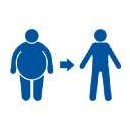

Weight loss surgery refers to surgical procedures that modify the structure and function of the digestive tract for weight reduction. These procedures help candidates lose excess weight and manage obesity-related medical conditions such as type 2 diabetes, obstructive sleep apnea, hypertension, and other risk factors for cardiovascular disease and stroke.
Also known as bariatric surgery, these treatments work by reducing the amount of food the stomach can hold, limiting calorie intake, and, in some cases, decreasing nutrient absorption. A number of surgical options are available for weight loss including gastric bypass, sleeve gastrectomy, and gastric banding.

A number of international patients choose India for bariatric surgery because the country offers affordability, advanced medical technology, and highly experienced bariatric surgeons. The leading weight loss hospitals in India are accredited by global quality bodies, ensuring international standards of safety and care. Lower treatment costs, shorter waiting times, and comprehensive medical tourism support services make India a preferred destination for patients needing cost-effective weight loss surgery.
The majority of us have trouble shedding extra pounds for a variety of reasons, including the following:
Despite the obstacles mentioned above, we are all surrounded by instances of individuals who have become physically healthy despite these obstacles by shedding excess kilograms with pure dedication and self-control. Finding a weight reduction program that is individualised to their needs, all-encompassing, and maintainable is the essential element in their tale of triumph.
You may not be surprised by the study's findings. After all, the idea that we should reduce our caloric intake while increasing our physical activity isn't exactly novel. Some of the conclusions of this study may be useful to those attempting to lose weight.

Keep in mind that your doctor may play a significant impact on your weight reduction journey. A physician, nurse, or qualified nutritionist can give you the encouragement you need to persevere in the face of everyday obstacles. You may learn more about the benefits of weight loss from your physician. They may recommend you to a dietitian or a mental health expert to help you lose weight and deal with the emotions that influence your eating.
Maintaining a consistent diet and exercise regimen is essential when you're attempting to lose weight. Dieters should keep track of their food consumption throughout their weight loss program to achieve the 500-calorie daily deficit recommended by the research. Whether you don't track your progress, you won't be able to tell if you're meeting your goals consistently.
So, how do you keep track of your daily caloric intake? You could one day be able to get rid of the numbers and replace them with a less complicated method, such as controlling the portions you eat. Some individuals utilize apps on their smartphones to keep track of their meal plans and calorie consumption, while others keep a written notebook. Use the way that is most convenient for you. At the start of your program, maintaining a calorie log may be helpful.
Changing your eating habits to lose weight is a good thing. Remember that weight reduction is a lifestyle change, not a food change alone. For weight reduction, you need to alter your daily routine and interact with people to deal with psychological and behavioural changes.
If you're serious about losing weight, you'll need to handle each of the three jobs. You must keep track of your daily calorie consumption, measure your weekly exercises, and keep an eye on your weight loss progress with the help of a fitness trainer or other specialist. Finally, if you make tiny adjustments, don't anticipate any significant outcomes.
Advice on how to lose weight naturally and easily are as follows:
According to an analysis of several researches, eating too quickly has been linked to weight increase. Why? Because eating slowly is easier when you chew your meal thoroughly. Consequently, people tend to eat smaller portions and feel fuller for longer.
According to the latest findings, recent studies have shown that consuming protein may decrease hunger and boost the sense of fullness. Losing weight quickly may be accomplished by reducing your caloric intake. You may get your protein intake from various sources like fish and Greek yoghurt.
Eating less junk food means faster weight loss, which makes sense if you use a smaller plate. You won't overindulge in bad foods if you use a smaller scale. According to studies, using a large dish might make portions seem more minor. In addition, larger containers may be used for nutritious meals.
Regarding weight loss, getting enough rest at night may make a big difference. Leptin and ghrelin are linked to sleep deprivation, which may lead to weight gain. Weight gain is exacerbated by these hormones, which cause the body to want unhealthy meals. Chronic diseases like diabetes may be prevented by getting enough sleep.
Drinking water instead of sugary and calorie-laden beverages may help you lose weight. Weight loss may be achieved by lowering caloric intake when water is consumed 30 minutes before the start of a meal. Individuals who drink water thirty minutes before meals lose 44 per cent more weight than those who don't. That's according to a new study.
If you’re considering India as an option for your weight loss surgery, finding the right doctor can help ensure long-term success. India is home to some of the most experienced bariatric surgeons, who are known for their expertise and comprehensive care. CureIndia helps connect patients with the best doctors for weight loss surgery in India. Let's hear from some of our best weight loss doctors in India:
Dr. Anshuman Kaushal is a top bariatric and metabolic surgery specialist in India, who is known for his expertise in weight loss surgery, minimally invasive bariatric procedures, and comprehensive obesity management. He is highly regarded for delivering personalised, safe, and effective treatments that help patients achieve lasting weight reduction and improved metabolic health.

Dr. Sumeet Shah is an expert bariatric surgeon in India with extensive experience in gastric bypass, sleeve gastrectomy, and adjustable gastric band procedures. Known for his precise surgical technique and thorough pre- and post-operative care, he provides long-term treatments for obesity and related health conditions.

Dr. Vinay Kumar Shaw specialises in minimally invasive weight loss surgery, including laparoscopic bariatric procedures and metabolic interventions. His treatment technique emphasises reduced recovery time, enhanced safety, and effective outcomes, making him a top choice for patients needing obesity treatments.

Dr. Rajat Goel is a leading bariatric and obesity surgery expert in India, with specialisation in comprehensive weight loss management, laparoscopic bariatric surgery, and metabolic care. His surgical techniques and all-inclusive patient-centric care help patients achieve sustainable weight reduction and improved health.

The cost of weight loss surgery in India, such as Sleeve Gastrectomy, Gastric Bypass or other bariatric procedures, is around $3,000 and $5,000. The final cost depends on factors like which procedure a patient chooses, the hospital, the surgeon’s expertise, whether pre- and post-surgical care are included, and any complications or additional treatments that are needed.
| Treatment Name | Cost in India | Stay in India |
|---|---|---|
| Allurion Gastric Balloon Procedure in India | $4,000 | 3-4 Days |
| Gastric Bypass Surgery in India | $5,000 | 7 Days |
| Sleeve Gastrectomy Surgery in India | $5,000 | 7 Days |
Weight-loss surgery, often referred to as bariatric surgery, restricts the quantity of food a person can consume without feeling uncomfortable or reduces the amount of food and calories absorbed by the body. However, this may also lead to a lack of essential nutrients and vitamins. The following are examples of weight-loss operations that are often performed:

Gastric banding may be adjusted to fit your individual needs. The stomach is divided into two pouches with an inflatable band during this surgery. A small channel is created between two pouches when the band is tightened like a belt. Generally, the band is intended to remain in place indefinitely to prevent the opening from enlarging. In a gastric band, in this treatment, a portion of the stomach is eliminated, reducing the amount of food that may be stored in the body. Gastric sleeve surgery is more complex, but this procedure is more straightforward.
Gastric bypass surgery for the stomach, the surgeon builds a tiny pouch above the stomach to perform a gastric bypass (also known as a Roux-en-Y procedure). A tiny incision is made a little distance below the major stomach to link the small intestine to the new pouch. This portion of the intestine receives food and liquids straight from the pouch, bypassing the majority of the stomach in the process. Your post-surgery weight reduction program's success depends on your willingness to modify your diet and exercise routine long-term. In addition, there are several other therapies for obesity.
Hydrogels, these edible capsules are only available with a doctor's prescription and contain microscopic particles designed to expand in the stomach after absorbing water. Before eating, the tablets are swallowed and excreted in the bowels as faeces.
As part of this treatment, a small tube is inserted into the stomach. All of the stomach's contents are expelled after every meal.
Under the tissue of the abdomen, this device is implanted, which delivers periodic electric signals to the abdominal-vaginous nerve, informing the brain whether the stomach is empty or full.
A structured weight loss program can help a number of people. With the guidance of qualified weight loss experts, you'll create a personalised diet and exercise regimen tailored especially for you. You may meet with the experts in person for one-on-one or small group sessions. With the advice of a nutritionist and physical activity coach, you can implement a healthier diet and exercise routine.
Gadgets like cellphones, pedometers, and accelerometers may be able to assist you in monitoring how well you're keeping to your plan. To assist you with your strategy, the experts may make frequent phone or online contact with you. Online weight loss programs and commercial weight loss programs may also help some individuals.
With general anaesthesia and just a few minor incisions, laparoscopic weight loss surgery is the most common method of weight loss. This allows the surgeon to introduce tiny instruments and a scope coupled to an image-capturing camera. In addition to causing less discomfort and scars, laparoscopic surgery offers a lower risk of complications than open surgery. Laparoscopic surgery has the potential to hasten recovery time.
Certain patients may benefit more from open surgery, which necessitates a single big incision in the belly as opposed to laparoscopic surgery. An available procedure may be necessary if you've undergone stomach surgery previously, are obese, or have other medical issues.
There might be a lot of excess and loose skin following the procedure. There are, however, ways to deal with it.
Increasing muscle mass might aid in the reduction of extra visible skin. Physical exercise has also been demonstrated to have a favourable influence on self-esteem, which may alleviate self-consciousness about sagging skin.
To be marketed, natural or herbal cures don't have to show their safety or effectiveness. Many firming creams and over-the-counter medications may be found by a short Internet search or browsing the pharmacy shelves, all of which claim to firm and tighten loose skin. Unfortunately, these claims haven't been validated by the study. Using a new skincare product without seeing your doctor is never a good idea!
Some athletes use compression clothing while participating in sports or exercising. They may, however, be beneficial even if you've lost weight. Allergic reactions and infections are less likely to occur when the loose, extra skin is not rubbed against the skin of others. Chafing may be alleviated by using a lubricant powder.
Loose skin may be treated without surgery using radiofrequency energy. The collagen formation is prompted by applying heat generated by an alternating current operating at a high frequency.
Since no downtime or scars are involved, RF therapy has grown in popularity among patients. In addition to this, there is a possibility that the tone and firmness of your skin may improve. There's nothing wrong with scheduling an appointment merely because the procedure is becoming more popular. Choose an FDA-approved gadget and an FDA-certified practitioner after consulting with a medical expert before committing to the therapy.
